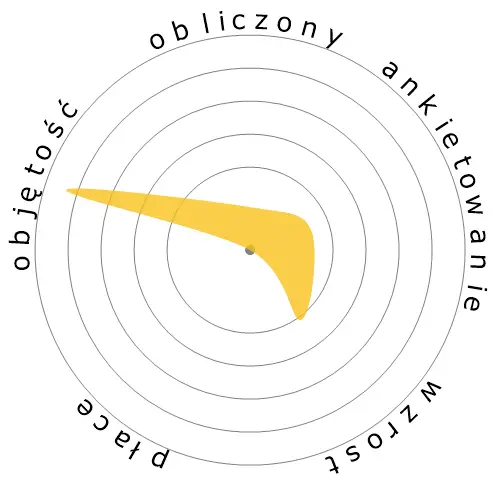Dozorcy i sprzątacze, z wyjątkiem pokojówek i sprzątaczy hotelowych




Ludzie również oglądali
Obliczone ryzyko automatyzacji
Wysokie ryzyko (61-80%): Zawody w tej kategorii stoją przed znaczącym zagrożeniem ze strony automatyzacji, ponieważ wiele z ich zadań może być łatwo zautomatyzowanych przy użyciu obecnych lub bliskich przyszłości technologii.
Więcej informacji na temat tego, czym jest ten wynik i jak jest obliczany, jest dostępne tutaj.
Ankieta użytkownika
Nasi goście głosowali, że nie są pewni, czy to zawód zostanie zautomatyzowany. Jednakże, poziom ryzyka automatyzacji, który wygenerowaliśmy, sugeruje znacznie większą szansę na automatyzację: 76% szans na automatyzację.
Jakie są Twoje zdanie na temat ryzyka automatyzacji?
Jakie jest prawdopodobieństwo, że Dozorcy i sprzątacze, z wyjątkiem pokojówek i sprzątaczy hotelowych zostanie zastąpione przez roboty lub sztuczną inteligencję w ciągu najbliższych 20 lat?
Nastroje
Poniższy wykres jest zamieszczany wszędzie tam, gdzie istnieje znaczna liczba głosów, aby przedstawić istotne dane. Te wizualne reprezentacje pokazują wyniki ankiet użytkowników w czasie, dostarczając istotnych wskazówek dotyczących trendów nastrojów.
Nastroje w czasie (rocznie)
Wzrost
Liczba ofert pracy na stanowisku 'Janitors and Cleaners, Except Maids and Housekeeping Cleaners' ma wzrosnąć 3,1% do 2033
Całkowite zatrudnienie oraz szacowane oferty pracy
Zaktualizowane prognozy mają być dostępne 09-2025.
Płace
W 2023, mediana rocznej pensji dla 'Janitors and Cleaners, Except Maids and Housekeeping Cleaners' wynosiła 35 020 $, czyli 16 $ za godzinę.
'Janitors and Cleaners, Except Maids and Housekeeping Cleaners' otrzymali wynagrodzenie niższe o 27,1% od średniej krajowej, która wynosiła 48 060 $
Płace z biegiem czasu
Objętość
Od 2023 roku zatrudnionych było 2 172 500 osób na stanowisku 'Janitors and Cleaners, Except Maids and Housekeeping Cleaners' w Stanach Zjednoczonych.
To oznacza około 1,4% zatrudnionej siły roboczej w całym kraju.
Inaczej mówiąc, około 1 na 69 osób jest zatrudnionych jako 'Janitors and Cleaners, Except Maids and Housekeeping Cleaners'.
Opis stanowiska pracy
Utrzymuj budynki w czystym i uporządkowanym stanie. Wykonuj ciężkie prace sprzątające, takie jak czyszczenie podłóg, szamponowanie dywanów, mycie ścian i szkła oraz usuwanie śmieci. Obowiązki mogą obejmować obsługę pieca i kotła, wykonywanie rutynowych czynności konserwacyjnych, informowanie zarządu o potrzebie napraw oraz usuwanie śniegu lub śmieci z chodnika.
SOC Code: 37-2011.00


Komentarze
Leave a comment
Don't get me wrong, i think it could be done, i just think the cost would be outrageous and that somebody would still often have to step in for unusual messes and vandalism.
A. Invest significantly in equipment and processes that make the tasks much easier to do, and
B. Put a lot of personal responsibility on the people causing messes, generating the trash, and otherwise making the work that is needed to be done.
For A, restrooms would have to be redesigned with standards for toilets, urinals, sinks, etc where automated brushes could easily reach them. Trash receptacles would also need regular emptying and cleaning. It could be done, and I believe they've even invented self-cleaning restrooms where it basically treats the entire interior like a dishwasher, locking it off and doing high pressure sprays with sanitizing chemicals. It would be very very expensive to redesign them in such a way, not to mention the ongoing maintenance costs of such precision equipment. Similar with locker/shower rooms, kitchenettes, and break areas.
For B, in order for desk waste receptacle collection to be automated, office workers would need to actually throw trash inside the trash can and not beside, behind, or underneath. They would need to have it in a fixed position, and keep the area in front of it clear, and not obstructed with personal items, stacks of paper, or other junk. Similar to automated vacuum robots, they would need the area they're to clean free of obstacles. The best way to clean greasy fingerprints off glass doors is simply not have them there in the first place; train people to put their hands on the handle. Office workers in particular are incredibly inconsiderate of the work they leave for others, and office facilities would rather hire double the amount of cleaning staff to be demeaned and jump through ridiculous and unnecessary hoops.
The amount of investment needed to automate janitorial tasks would be incredibly high. If they really wanted to save money, they could instantly probably cut 25-50% of their workforce budget by being considerate to others. But they'd much rather waste money on digging their heels into classism, ensuring there are "servants" to look down upon.
I am currently writing this comment using an artificial intelligence aid. It is called Grammarly. I write rather well on my own, the help though is appreciated. It can improvise upon what I'm going to write.
Does this mean it reads my mind? No, it uses algorithms to prognosticate what is coming based upon my previous writing. From that, it can then access other algorithms that study grammatical rules and policies. That allows it to use an algorithm to assist my writing by editing.
My point being case variables in programmatic instructions can be defined so as to "follow" and "cope" with people. I work as a custodian presently for our county's public schools, which we have from pre-school to grade twelve. Children are the most unpredictable of all humans.
I can easily see how timing schedules, sensors, algorithms could all be put in place to cut my workload by two-thirds, or more. My work can be greatly automated. Still, there would need to be technicians both to repair the physical and mechanical aspects and to repair the computing code at times. So I say it could go either way.
Zostaw odpowiedź na temat tego zawodu